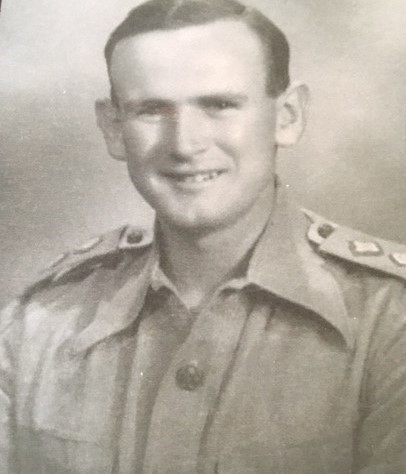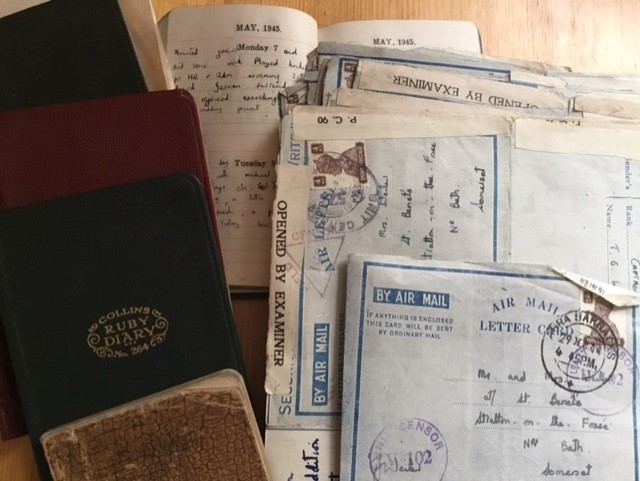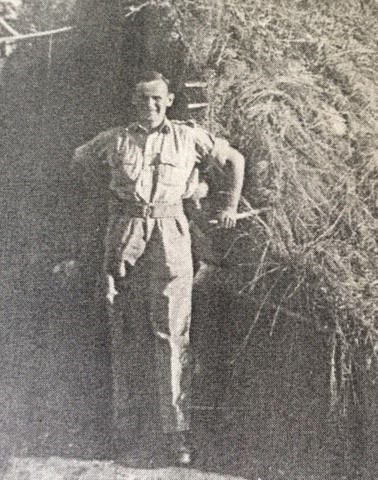Football For The Troops: World War Two Memories
15/04/2021 - 2.00
Martin Weiler
“A colossal battle”.
That was how my father described the action on Christmas Day 1942. But it wasn’t fighting the Japanese – it was an inter troop football match taking place at their camp near Ranchi in India.
“The first event on the programme was the final of our football cup (between B and D Troops) – resulting in a draw in spite of terrific vocal support. The officers and sergeants then served up the men’s dinner – duck and Christmas pudding, a bottle of beer, cigarettes and boiled sweets”.
This symbolised the important role football played in both keeping the troops fit and well and keeping up morale. It was an ever present part of army life alongside other sports during training in the UK and while on duty around the world.
I have discovered much of the detail that follows thanks to taking advantage of Lockdown to read my Dad’s diaries and letters home during his service between 1940 and 1945. So here are some of the insights into recreational military football as provided by Captain Terry Weiler (164184 60th Field Regiment Royal Artillery).

Dad was a club rugby player and for his officer training was based at a variety of camps including Bulford and Larkhill in Wiltshire, Cudworth in Yorkshire and around Essex. Now he had to get used to football alongside his favoured sport. Arriving at Bulford in April 1940, he was soon in action on the 28th of that month. His diary records: “Played football – outside right. Lost 1-9 (4 casualties)”.
Writing to his parents in August, he mentions the start of the soccer season and in his next letter says: “We played football on Wednesday and were quite melted down by the end of it. I am being made a soccer player in spite of myself, and get a good laugh out of it, if nothing else”.

Later in September, he explains a bit more about the organisation of the games: “There is a soccer league too: each troop has two teams, one of which I play for. This afternoon after a hot game of Rugby, I followed up with a soccer match which we won 3-2, in great triumph”.
There was plenty of rugby too which often seemed to involve punch ups and injuries. On 2 October 1940, Dad records: “Rugger v 25 Course. I score a try and have a fracas. They had an international playing for them too – Renwick of Scotland. He didn’t get away with much”.
There is quite some poignancy to this brief mention. William Renwick had made his debut in front of 70,000 at Twickenham in 1938, as Scotland beat England 21-16. Renwick scored two tries. In 1944, he was killed in action at Bolensa in Italy aged just 29. A reminder that all this sport was part of a much bigger picture.
Other sports were on offer – there are mentions of boxing, tug of war, cross country running and athletics for example. Cricket was not Dad’s forte but in May 1941, he records: “GRAND cricket match: a neck and neck struggle 61-59. I got a duck but took the final wicket with one the most atrocious balls I have ever bowled – a dramatic full toss”.
On 23 March 1942, Dad set sail for India where he was to be based for the rest of the war. A totally new experience but football was to provide some continuity with home amid all the training and exercising for jungle warfare.
Writing to his parents in October, he says: “The weather being reasonable we shall be putting in one or two sports events. I know of some elsewhere who are playing a good deal of Rugby but we go in mostly for soccer”. As they did, of course, on Christmas Day.
In July 1943, Dad writes: “There has been a good deal of sport and this week I have played Rugger, Soccer and Squash with Tennis I hope to follow this evening. That is one advantage of the Monsoon – it produces soft ground and grass. The rugger was grand and even though I hadn’t played for over a year I wasn’t too stiff”.
By August, Dad has become Regimental Sports Officer. He tells his parents: “I now busy myself with pitches, fixtures and selection committees. Like most other things in life there seems to be very little co-operation but we struggle on. Our main pitch is shortly to be a thing of beauty and I was in town to fix up nets and regulation goal posts. There are two Cups being competed for and a League to come”.
Despite spending more time now on sports administration – Dad even sits on the Soccer Committee – he still gets time to play. “Wednesday night I played for the Troop 2nd X1 against A Troop 2nds. These are very jolly games and the spectators enjoy them even more than the poor players who come in for a good deal of candid criticism from their pals and admirers. We drew 2-2 so rested content. I played left back”.
Later in September, he is questioning the local ground staff. “A Regimental soccer game which we won easily 6-1. Rugger in the afternoon. It was a ghastly waterlogged pitch – they have no sense of proportion here and water the ground even after a rain storm”.
By November, things are hotting up with the Japanese and Dad’s focus is more on learning Burmese and studying the intricacies of jungle warfare. He moves to a remote camp in northern India nearly 100 miles from the nearest town.

But despite this on 6 December, Dad records: “Dug football pitch for an hour” and the following week “Soccer pitch now in use”. On 20 December, “Played the Sergeants at soccer, lost 7-2. Rested weary of world”. On Christmas Eve there was a “grim battle with Essex winning 4-1”. Dad tells his parents that the game “…caused a large crowd much delight and a chance to exercise their wits”.
What is extraordinary, or maybe psychologically vital, is that as the tension mounted in early 1944, football continued to play a role. Amazingly in the very days before Dad’s Troop went off as Chindits to disrupt the Japanese advance through Burma, games were played. Dad tells his parents “…there has been a revival of football (officers variety) lately”. On 24 March: “Played Essex and drew 2-2. Did not shine”. On 31 March: “Officers defeated Sergeants at soccer 3-2”. The next day they packed up and on 2 April left for a major operation that would last three months in the most inhospitable of conditions.
Football must have seemed a world away as the soldiers made their way on a march through remote parts of India and Burma. It was brutal. On 28 June, Dad recorded: “Track thick with mud and littered with skeletons, animal and human”. On 2 July: “Not feeling too good – a touch of fever. Reached Ngacham which the Japs had burned out in revenge”.
Thankfully, the operation was successful and Dad returned to India, moving to a camp near Bangalore. Time for football again. His diary on 29 August records “…left for town in jeep. Bought football boots”. And so the football continued: 9 Feb 1945 “…took the football game seriously but lost 10-3” and 23 Feb “played left back v Sergeants and lost 7-1”.
India had also sowed another sporting seed. Dad took up hockey there, a game he later played back in England after retiring from Rugby. On 7 May, there is a great juxtaposition in his diary: “Played hockey for HQ v Admin winning 3-1. Heard German surrender and rejoiced accordingly”.
Two days holiday were declared on 9 and 10 May and it was football that marked the celebrations on the 9th: “Most awful game against the sergeants. Played right back and had it long before the end”.
Football continued (16 June: “…played soccer v the sergeants, losing 5-0”) as the military situation eased. Then on 15 August, Dad notes “There seems to be a general theory that the Japanese war is over”. This time football is dispensed with and it is straight to the bar: “Purchased my liquor ration and was given 5 beers so am now broke”.
Dad left India on 27 October and sailed home. For him the war was over - as was his football career.
Terry Weiler died in 2011. His war time memories can be heard on Imperial War Museum recordings here.
Biography
Brought up in London watching Hounslow Town, Brentford and Spurs, Martin studied History and Archaeology at the University of Exeter and stayed on to work and live in the Devon city. This led to following Exeter City and increasingly getting involved as the Supporters Trust became owners in 2003. Martin was a member of the Trust Board for nine years and in 2016/7 was Trust Chair and a Club Director. Martin is a Trustee of the Exeter City Football Club Museum Trust.



/prod01/wlvacuk/media/departments/media-and-communications/images-18-19/220325-Engineers_teach_thumbail.jpg)
/prod01/wlvacuk/media/departments/media-and-communications/images-18-19/BBR_logo_large.jpg)
/prod01/wlvacuk/media/departments/media-and-communications/images-18-19/Wolves-Story-Thumb.jpg)
/prod01/wlvacuk/media/departments/media-and-communications/images-18-19/220505-BAS9-School-Showcase-Resized.jpg)
/prod01/wlvacuk/media/departments/business-solutions/images/banners/business-we-back-you-500x250.jpg)